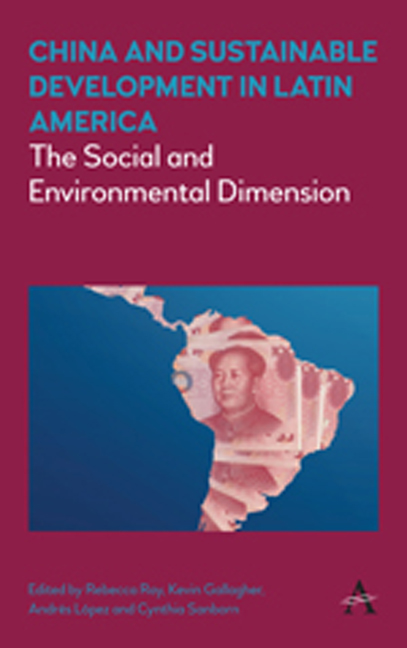Book contents
- Frontmatter
- Contents
- List of Illustrations
- Acknowledgments
- Part I INTRODUCTION AND REGIONAL OVERVIEW
- Part II CHINA'S AND LATIN AMERICA'S HYDROCARBONS SECTORS
- Chapter 2 FDI and Trade: Is China Relevant for the Future of Our Environment? The Case of Argentina
- Chapter 3 Colombia and China: Social and Environmental Impacts of Trade and Foreign Direct Investment
- Chapter 4 A Line in the Equatorial Forests: Chinese Investment and the Environmental and Social Impacts of Extractive Industries in Ecuador
- Part III CHINA'S AND LATIN AMERICA'S MINING SECTORS
- Part IV CHINA'S AND LATIN AMERICA'S AGRICULTURAL SECTORS
- Part V CHINA'S AND LATIN AMERICA'S MANUFACTURING SECTORS
- Notes on Contributors
- Index
Chapter 2 - FDI and Trade: Is China Relevant for the Future of Our Environment? The Case of Argentina
from Part II - CHINA'S AND LATIN AMERICA'S HYDROCARBONS SECTORS
Published online by Cambridge University Press: 12 September 2017
- Frontmatter
- Contents
- List of Illustrations
- Acknowledgments
- Part I INTRODUCTION AND REGIONAL OVERVIEW
- Part II CHINA'S AND LATIN AMERICA'S HYDROCARBONS SECTORS
- Chapter 2 FDI and Trade: Is China Relevant for the Future of Our Environment? The Case of Argentina
- Chapter 3 Colombia and China: Social and Environmental Impacts of Trade and Foreign Direct Investment
- Chapter 4 A Line in the Equatorial Forests: Chinese Investment and the Environmental and Social Impacts of Extractive Industries in Ecuador
- Part III CHINA'S AND LATIN AMERICA'S MINING SECTORS
- Part IV CHINA'S AND LATIN AMERICA'S AGRICULTURAL SECTORS
- Part V CHINA'S AND LATIN AMERICA'S MANUFACTURING SECTORS
- Notes on Contributors
- Index
Summary
As with many other Latin American countries, China's economic presence in Argentina has become very significant over the past decade. Most significantly, China has become the main export destination for Argentina's soy products. Increasingly, Argentina is also becoming a strategic location for Chinese firms to invest in oil and gas.
After providing an overview of these trends, this chapter examines in two ways the social and environmental ramifications of Chinese economic engagement in Argentina. First is an aggregate statistical analysis of the greenhouse gas and water intensity of Chinese economic activity in Argentina. Second is a field- based case study of the performance of Chinese firms in Argentina's oil and gas sector.
In terms of greenhouse- gas emissions, we find that China is Argentina's only major export destination for which emissions intensity is growing, and total emissions to China rank second (to Brazil) in terms of trade- based emission from Argentina. In terms of China's water footprint in Argentina, we find that by 2012 China had the second- largest water footprint (to Spain) in 2012, due to the concentration of Chinese imports from Argentina's water- intensive soy sector.
Our case study on Chinese investment is also revealing. Of course it must be acknowledged that oil extraction in Argentina (indeed anywhere) is endemically environmentally degrading. Moreover, due to the fact that Chinese investment in Argentina's oil sector is in the form of mergers and acquisitions (M&As) it is difficult to assign responsibility to environmental damage and liability because environmental damage could be a function of previous ownership. Nevertheless, we find that Chinese firms have been assigned blame for increasing amounts of environmental damage, although they may not be responsible for such damage.
Our fieldwork gives some indication that Chinese firms tend to be more environmentally responsible when in a merger with a Western firm. For example, Sinopec partners with British Petroleum, which has the capabilities to adhere to stricter environmental standards and is under intense scrutiny for its overseas operations by global governments and non-governmental organizations (NGOs).
- Type
- Chapter
- Information
- China and Sustainable Development in Latin AmericaThe Social and Environmental Dimension, pp. 33 - 72Publisher: Anthem PressPrint publication year: 2017



